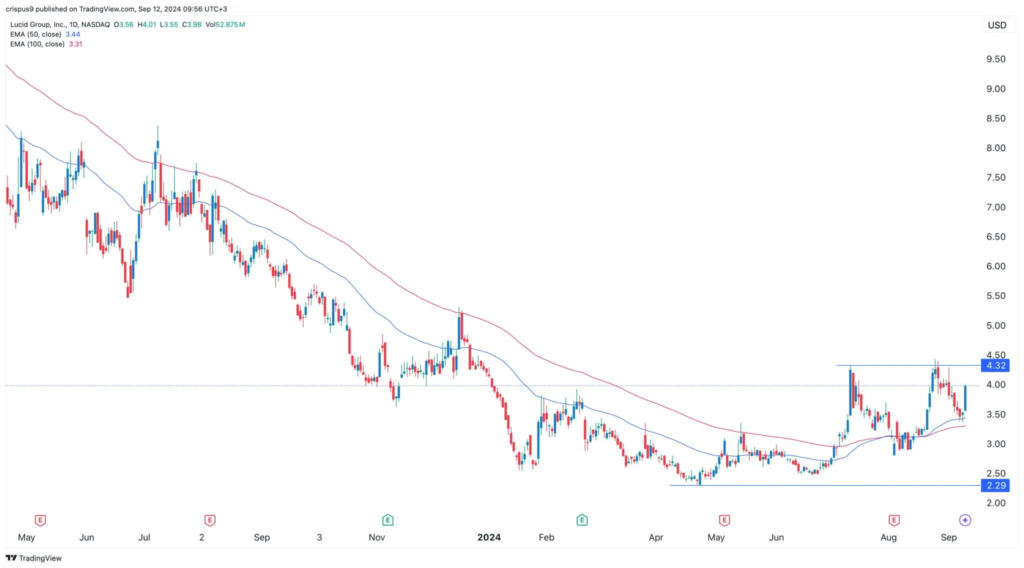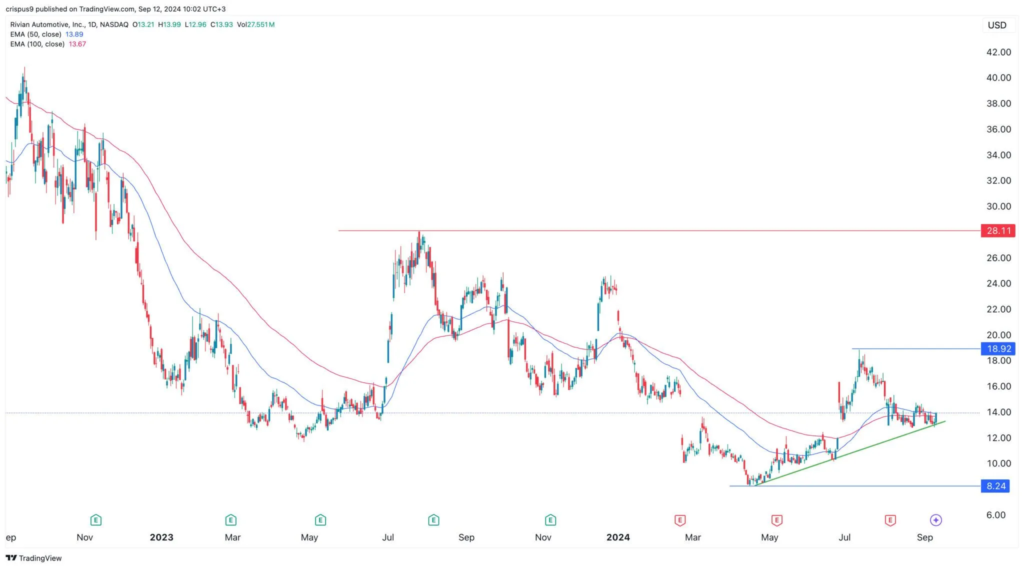What Lies Ahead for Lucid Group and Rivian Stocks?

- Slowing EV demand in the U.S. is driving more consumers to choose leases over purchases.
- Lucid Group and Rivian Automotive have been burning through cash for some time.
- Both companies’ stocks surged after securing crucial funding from Saudi Arabia and Volkswagen.
The stock prices of Rivian (RIVN) and Lucid Group (LCID) have made a remarkable recovery in recent months. Lucid has seen a nearly 50% increase over the past quarter, while Rivian has gained close to 20% during the same period. Meanwhile, Tesla, the electric vehicle (EV) pioneer, has experienced a 35% rise in the same timeframe.
Are you looking for the best trading platform? Sign-up to the best trading platform for you for FREE. Takes 2 mins.
Ongoing Challenges for EV Makers
Despite the upward movement in stocks like Rivian, Lucid, and Tesla, the EV industry continues to face significant hurdles.
One of the primary challenges is the industry’s shift from early adopters to the mainstream market, which poses difficulties. Early adopters tend to be wealthier, while the mass market is more cautious and selective with their purchases.
A key indicator of this shift is data from Cox Automotive, showing that the proportion of U.S. EV transactions involving leases has been climbing rapidly. Lease agreements now account for 32% of EV sales this year, compared to just 9% in 2022. Interestingly, the leasing rate for Rivian vehicles sits at 15.2%, lower than companies like Tesla, BMW, and Audi.
This uptick in leasing suggests that mainstream consumers are hesitant to make large financial commitments when purchasing new EVs. It also signals that leasing options have become more affordable for the average buyer. In fact, a recent Bloomberg report highlighted that some dealers are offering leases for as little as $20 per month on certain Nissan Leaf models.
Another issue for Rivian and Lucid is the growing popularity of hybrid vehicles in the U.S., where companies like Toyota and Ford have gained a competitive edge in this segment.
Perhaps the biggest threat to these U.S.-based EV makers is the increasing dominance of Chinese EV manufacturers, which has prompted the Biden administration to propose a 100% tariff on vehicles imported from China. While these tariffs remain largely symbolic, as Chinese companies are not yet selling EVs in the U.S., their rapid growth raises the possibility of future competition in the American market.
Depreciation Concerns
Depreciation is another factor deterring consumers from buying new EVs. For example, a new Lucid vehicle depreciates by approximately 65.6% after five years, close to the luxury car segment’s average depreciation rate of 65.8%.
Financial Struggles: Lucid and Rivian
Despite their recent gains, both Rivian and Lucid remain cash-burning machines, even years after they started delivering vehicles.
In its latest earnings report, Rivian revealed it had delivered 13,790 vehicles in the second quarter, generating over $1.15 billion in revenue. However, the company reported a negative gross profit of more than $412 million and a net loss exceeding $1.45 billion. This translates to a loss of $83,393 for every vehicle delivered.
Lucid Group, meanwhile, delivered just 2,394 vehicles in the second quarter, with revenues topping $200 million. Its net loss for the quarter was over $643 million, meaning the company lost approximately $268,000 per vehicle.
These companies continue to operate thanks to significant investments from their backers. Lucid Group ended the last quarter with over $4.28 billion in liquidity, bolstered by a $1.5 billion commitment from Saudi Arabia’s Public Investment Fund (PIF).
Similarly, Rivian—which raised over $11.9 billion during its IPO—continues to burn through cash. In 2023, the company raised additional funds and recently secured a $5 billion investment from Volkswagen Group.
Both companies have seen their shareholder base diluted in recent years. Rivian’s outstanding shares have increased from 892 million in 2022 to more than 1 billion today, while Lucid’s share count has surged from 1.64 billion to over 2.3 billion.
Lucid Stock Outlook

Lucid’s stock has rallied as investors anticipate the upcoming launch of the Gravity SUV. This model is expected to be a relatively affordable electric SUV that will be compatible with Tesla’s charging network.
From a technical perspective, Lucid’s share price formed a double-top pattern at $4.32, a bearish signal in price action analysis. This suggests that the stock could face a significant decline in the near future. However, this bearish outlook would be invalidated if the stock breaks above the $4.32 level and holds above the 50-day and 100-day moving averages.
Rivian Stock Outlook

Rivian’s stock has also seen a notable recovery, bouncing from a low of $8.25 in May to its current price of $14. The stock is consolidating around the 50-day and 100-day moving averages, and it remains above the ascending trendline that has formed since May.
The outlook for Rivian remains moderately bearish, with a potential drop to $10, which would be about 30% lower than its current level. However, if the stock breaks above $16, this bearish perspective would be invalidated.
S&P 500 Hits Record High; Dow Gains as Longboard Pharmaceuticals Surges 51% and Tech Stocks Rise S&P 500 Reaches Record
S&P 500, Dow Notch Record Closing Highs as Crude Slumps Major Indexes Set Record Highs: The S&P 500 and Dow
Should You Buy Plug Power Stock While It’s Trading Below $4? A Closer Look at the Hydrogen Pioneer’s Future Plug
MicroStrategy Stock Rises 550% in 2024: Should You Invest? MicroStrategy (NASDAQ: MSTR) has been one of the top-performing stocks in
One of Tesla’s Biggest Bulls ‘Disappointed’ After Robotaxi Event Tesla’s much-anticipated Robotaxi event left one of its most ardent supporters
